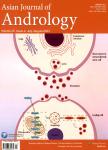Endovascular treatment of vasculogenic erectile dysfunction
腔内介入治疗血管性勃起功能障碍作者机构:University of Tennessee Graduate School of Medicine Knoxville TN USA.
出 版 物:《Asian Journal of Andrology》 (亚洲男性学杂志(英文版))
年 卷 期:2015年第17卷第1期
页 面:40-43,I0007页
核心收录:
学科分类:10[医学]
主 题:erectile dysfunction impotence penile erection vasculogenic
摘 要:The treatment of erectile dysfunction (ED) has been a fascination involving multiple medical specialities over the past century with urologic, cardiac and surgical experts all contributing knowledge toward this multifactorial disease. With the well-described association between ED and cardiovascular disease, angiography has been utilized to identify vasculogenic impotence. Given the success of endovascular drug-eluting stent (DES) placement for the treatment of coronary artery disease, there has been interest in using this same technology for the treatment of vasculogenic ED. For men with inflow stenosis, DES placement to bypass arterial lesions has recently been reported with a high technical success rate. Comparatively, endovascular embolization as an approach to correct veno-occlusive dysfunction has produced astonishing procedural success rates as well. However, after a thorough literature review, arterial intervention is only recommended for younger patients with isolated vascular injuries, typically from previous traumatic experiences. Short-term functional outcomes are less than optimal with long-term results yet to be determined. In conclusion, the hope for a minimally invasive approach to ED persists but additional investigation is required prior to universal endorsement.



